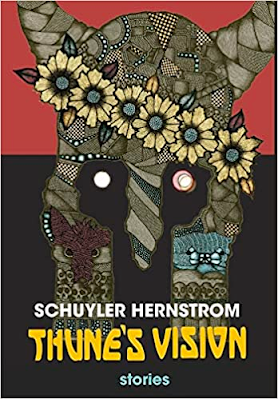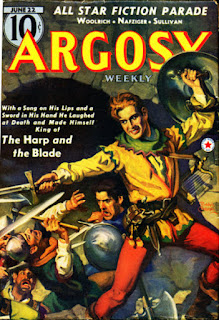 |
| Feel the fury, of a possessed 1958 Plymouth Fury |
My reading often keeps me in a well-worn, familiar travel lane.
That lane is, broadly, fantasy. Sword-and-sorcery being the sweet spot.
Adjacent lanes are horror, SF, and adventure fiction/historical fiction.
I also read a lot of non-fiction—some for work, some for self-improvement, but also stuff like WWII history, true crime, maritime disasters. I put non-fiction in a separate category. I read it with a destination in mind, getting things done for important reasons, like learning a new skill. Think airline business travel. As opposed to fiction which (ideally) is like getting behind the wheel of a 1969 Chevelle SS and hitting the gas.
Come to think of it, sword-and-sorcery is like a 1960s/70s muscle car. Loud, powerful, a little dangerous. Like a vintage muscle car I enjoy its aesthetics, how it performs. It has its drawbacks. It’s not always safe, or reliable. It has poor gas mileage. But, when its Robert E. Howard, or Fritz Leiber, or Poul Anderson, or Jack Vance, it’s pretty reliably fun, at least. Sometimes, more than that.
But occasionally I turn the wheel, to the left and right, and veer out of my reading lane. Once in a while I go off-roading, or change cars altogether.
The driving metaphors are coming freely/obnoxiously because right now I’m immersed in Stephen King’s Christine. I haven’t read this one in oh… 25 years? 30? I don’t know about you, but my mind is a sieve when it comes to retaining (most) details of books read long ago. So my memory of Christine is awful scant. The good news is, this 40-year-old book (published 1983) is almost new to me at this point.
Christine is quite good so far, very compelling. As King often is, especially his older stuff.
Anyways, the experience got me to thinking… what is my lane, and why do I stay in it? What causes me to drift, or swerve?
Underneath it’s all the same urge. To find great writing.
I place good, entertaining writing as the highest value in my fiction reading, regardless of what form it takes. Good writing is followed by interesting ideas. Third, but still important, are the comfortable, familiar tropes (swords, wizards, battles, magic, monsters).
It’s rare to get all of these in the same spot. When it does occur, as with something like The Lord of the Rings, “Beyond the Black River,” or Watership Down, it’s a book or a story that I will cherish, and return to again and again.
Back to Christine. This book definitely checks the first two boxes. It’s out of my fantasy/S&S lane. But, it delivers with good writing that is just plain fun. It almost feels cozy, with its ability to put me back in a time (it’s set in 1978) that is pretty close to my youth. The nostalgia is nice.
And, it contains an interesting idea.
The idea is the dangerous transition to adulthood. That’s what Christine represents. She is the machine that kids inherit, at 16 or 17 or 18, that guides them into a different phase of life. Buying your first car is a rite of passage. It feels adult, but it also allows you to escape the confines of your home, or immediate neighborhood, and go places. Making the transition to adulthood is something we all must do, and not all of us make it (literally—some die on the roadways, and figuratively--some remain stuck in perpetual childhood or adolescence).
That’s scary, and King skillfully handles this idea in Christine. As with this passage, my favorite so far:
By the time I had the mounted tire back in my trunk and had paid the guy two bucks for the job, the early evening light had become the fading purple of late evening. The shadow of each bush was long and velvety, and as I cruised slowly back up the street I saw the day’s last light streaming almost horizontally through the trash-littered space between the Arby’s and the bowling alley. That light, so much flooding gold, was nearly terrible in its strange, unexpected beauty.
I was surprised by a choking panic that climbed up in my throat like dry fire. It was the first time a feeling like that came over me that year—that long, strange year—but not the last. Yet it’s hard for me to explain, or even define. It had something to do with realizing that it was August 11, 1978, that I was going to be a senior in high school next month, and that when school started again it meant the end of a long, quiet phase of my life. I was getting ready to be a grown-up, and I saw that somehow—saw it for sure, for the first time in that lovely but somehow ancient spill of golden light flooding down the alleyway between a bowling alley and a roast beef joint. And I think I understood then that what really scares people about growing up is that you stop trying on the life-mask and start trying on another one. If being a kid is about learning how to live, then being a grown-up is about learning how to die.
I love that line, “end of a long, quiet phase of my life”… that so describes my early years, too. And King’s familiar, blue-collar details—the Arby’s, the bowling alley—make it feel real, and relatable.
I suspect King was remembering a similar scene from his past, that flood of golden light, and that realization. And channeling his own experiences of growing up, and making the difficult transition to adulthood.
Christine also has something of the tropes I like. A demonic, ghostly car. But, this comes third. A possessed car is kind of a dumb idea to be honest. King makes it work, because he has the first two elements down pat.
In summary, here’s what I like about fiction.
- A great story that takes you to another place. When the author does so with tension, spooled out, building to a crescendo, maybe 2-3 times during the same book or story, I’ll read this book.
- The interesting idea underneath.
- The cool details, the paint and polish and shiny hood ornaments. Aka, the genre.
A bad story will miss on all three, or focus on one to the detriment of the others. You need balance. The worst is probably the story that aims at no. 3 and fails even at that. Think of the loud and dumb barbarian protagonist that apes Conan, or the splatterpunk horror author who copies King’s gruesome details but whose writing lacks heart or purpose, or the requisite skill.
So yeah, Christine is not sword-and-sorcery, but is very much in an adjacent lane of my reading tastes. It checks (most of) the boxes I enjoy.
Now we’ll see if King can stick the landing—not his strongest suit.

















